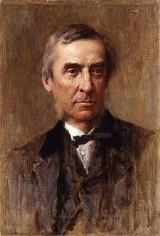
historian
, novelist, biographer
, and editor
of Fraser's Magazine
. From his upbringing amidst the Anglo-Catholic
Oxford Movement
, Froude intended to become a clergyman, but doubts about the doctrines of the Anglican church, published in his scandalous 1849 novel The Nemesis of Faith
, drove him to abandon his religious career. Froude turned to writing history, becoming one of the best known historians of his time for his History of England from the Fall of Wolsey to the Defeat of the Spanish Armada.
I cut a hole in my heart and wrote with the blood.![]()
Nature is less partial than she appears, and all situations in life have their compensations along with them.![]()
The moral of human life is never simple, and the moral of a story which aims only at being true to human life cannot be expected to be any more so. ![]()
I am convinced with Plato, with Paul of Tarsus|St. Paul, with Augustine of Hippo|St. Augustine, with John Calvin|Calvin, and with Gottfried Leibniz|Leibnitz, that this universe, and every smallest portion of it, exactly fulfils the purpose for which Almighty God designed it.![]()
Man is a real man, and can live and act manfully in this world, not in the strength of opinions, not according to what he thinks, but according to what he is. ![]()
I do not dishonour the Bible. I honour it above all books. The New Testament alone, since I have been able to read it humanly, has to me outweighed all the literature of the world. It is because we dishonour it by making it an idol, and destroy its power by the foolish means with which we think to enhance it, that I have said what I have felt it my duty to say.![]()

